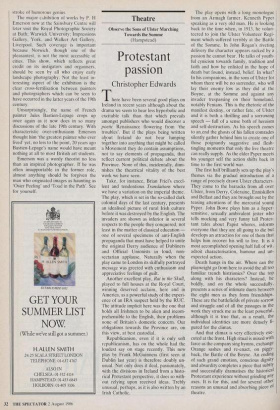Theatre
Observe the Sons of Ulster Marching Towards the Somme (Hampstead)
Protestant passion
Christopher Edwards
There have been several good plays on Ireland in recent years although about the drama we seem to hear less hyperbolic and excitable talk than that which prevails amongst publishers who would discover a poetic Renaissance flowering from 'the troubles'. But if the plays being written about Ireland do not bear lumping together into anything that might be called a Movement they do contain assumptions, not to say elements of propaganda, that reflect current political debate about the Province. None of this, incidentally, dimi- nishes the theatrical vitality of the best work we have seen.
Take, for instance, Brian Friel's excel- lent and tendentious Translations where we have a variation on the imperial theme. The play, which is set in the so-called dark colonial days of the last century, presents an idealised picture of rural Irish culture before it was destroyed by the English. The invaders are shown as inferior in several respects to the people they conquered, not least in the matter of classical education — one of several specimens of anti-English propaganda that must have helped to unite the original Derry audience of Dubliners and Official Unionists in loud, non- sectarian applause. Naturally when the play came to London its skilfully portrayed message was greeted with enthusiasm and appreciative feelings of guilt.
Another excellent play, Rat in the Skull, played to full houses at the Royal Court, winning deserved acclaim, here and in America, as a powerful study of the experi- ence of an IRA suspect held by the RUC. The attitude implicit here was the one that holds all Irishmen to be alien and incom- prehensible to the English, their problems none of Britain's domestic concern. Our obligations towards the Province are, on this view, at best custodial.
Republicanism, even if it is only soft republicanism, has on the whole had the loudest say on stage recently. This new play by Frank McGuinness (first seen at Dublin last year) is therefore doubly un- usual. Not only does it deal, passionately, with the divisions in Ireland from a histo- rical Protestant perspective, it does so with- out relying upon received ideas. Trebly unusual, perhaps, as it is also written by an Irish Catholic.
The play opens with a long monologue from an Armagh farmer, Kenneth Pyper speaking as a very old man. He is looking back to the time when, in 1913, he volun- teered to join the Ulster Volunteer Regi- ment which suffered terribly at the Battle of the Somme. In John Rogan's riveting delivery the character appears racked by a passion he cannot bear. He talks of youth- ful cynicism towards family, tradition and faith and how he enlisted in the hope of death but found, instead, belief. In what? In his companions, in the sons of Ulster for whom there will be no surrender, who will lay their enemy low as they did at the Boyne, at the Somme and against any invader trespassing on their homeland, notably Fenians. This is the rhetoric of the manifest destiny, or rather fate, of Ulster and it is both a thrilling and a sorrowing speech — full of a sense both of heroism and self-destruction. As his speech comes to an,end the ghosts of his fallen comrades silently gather behind him to create one of those poignantly suggestive and flesh- tingling moments that only the live theatre can really supply. As the elder Pyper meets his younger self the action shifts back in time to the first world war.
The first half brilliantly sets up the play's themes via the gradual introduction of a range of precisely drawn Ulster characters. They come to the barracks from all over Ulster, from Derry, Coleraine, Enniskillen and Belfast and they are brought out by the teasing attentions of the mercurial young Pyper. John Bowe plays him as a hyper- sensitive, sexually ambivalent jester who tells mocking and very funny tall Protes- tant tales about Papist whores, informs everyone that they are all going to die but develops an attraction for one of them that helps him recover his will to live. It is a most accomplished opening half full of wit, adroit characterisation, humour and un- expected action.
Death hangs in the air. Where can the playwright go from here to avoid the all too familiar trench histrionics? Over the top along with his characters? Instead, he boldly, and on the whole successfully, presents a series of intimate duets between the eight men as they form friendships. Theseare the battlefields of private sorrow and struggle and of all the passages in the work they struck me as the least powerful, although it is true that, as a result, the individual identities are more densely fi- gured for the climax.
And that climax is very effectively exe- cuted at the front. High ritual is mixed with farce as the company sing hymns, exchange Orange sashes and re-enact, on piggY- back, the Battle of the Boyne. An ending of such grand emotion, conscious dignitY and absurdity completes a piece that subtly and successfully dramatises the historical Protestant experience without grinding anY axes. It is for this, and for several other reasons an unusual and absorbing piece of theatre.










































 Previous page
Previous page